If you’re looking for some free Shopify alternatives, you’re in the right place.
According to our research, Square Online is the best choice if you're looking for a free alternative to Shopify, because of its generous free plan, and Ecwid came in second as since it has a functional free plan that allows you to sell across multiple platforms.
Why Choose Shopify?
For many entrepreneurs, Shopify is one of the best ecommerce platforms on the market. The flexible ecosystem provides business leaders with everything they need to launch a site and start selling just about anything.
Features include everything from secure payment processing tools to endless themes and templates. Plus, Shopify’s app marketplace makes it easy to add new functionality without accessing developer skills or complex APIs.
Depending on your business plan with Shopify, you can access shopping cart functionality, cart recovery, eBay, and Amazon integrations and more.
Why Choose a Free Shopify Alternative?
For budget-conscious individuals, Shopify isn’t always the cheapest option. Alongside monthly plans for your capabilities, you’ll also need to pay transaction fees (outside of Shopify payments), and there can be extra costs to consider for premium themes and plugins.
While free alternatives to Shopify might not provide the same breadth of capabilities, they can be a good way for business leaders to start developing their store on a low budget. Today, we’re going to examine just some of the top free options on the market. Let’s jump in.
Things to Consider Before Choosing a Free Alternative
What are the Best Free Shopify Alternatives?
1. Square Online
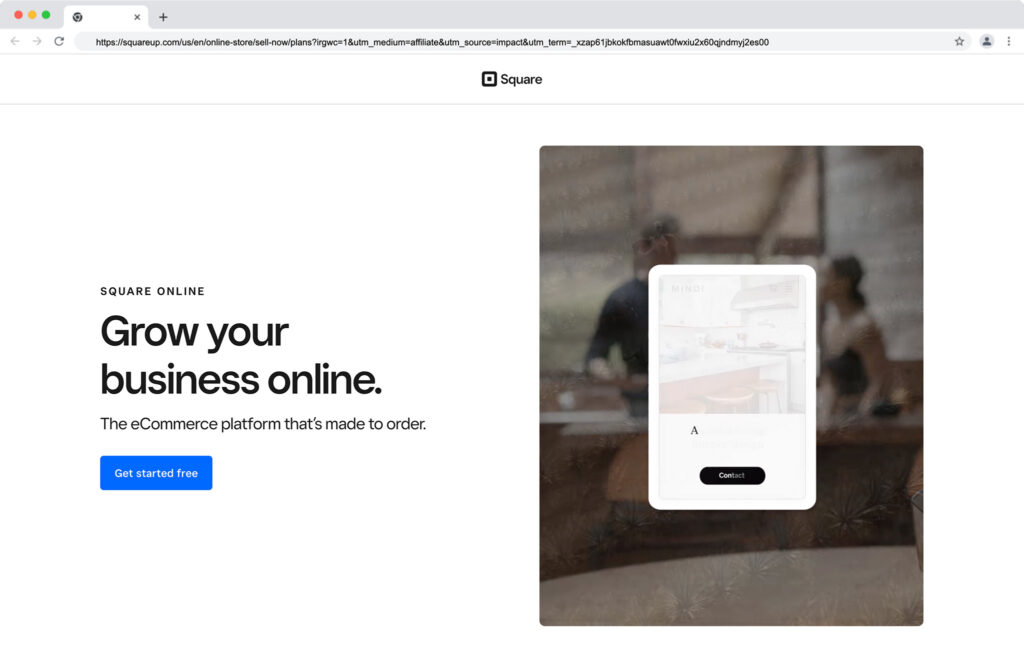
Most people know Square as a leading payment processing solution. The company offers point of sale (POS) systems and secure transaction technology for businesses around the world. However, Square can also help you to build an engaging website too. Square Online will allow you to build a website or online store for free, using aspects of the Weebly platform.
The service is extremely easy to use, and suitable for all kinds of online sellers, with omnichannel sales capabilities, and instant inventory syncing for your online and offline stores. There are various templates to choose from to get you started, and a convenient building system so you can customize all of the aspects of your store with a couple of clicks.
Square customers can use marketing tools to drive buyers towards specific products and promotions, generate hype for events, and more. Plus, there are various great tools for offline sellers, such as local delivery planning services, free click and collect options, and delivery rules. As an added benefit, users can also accept Square Pay, Google Pay, or Apple Pay for transactions.
The Free Plan
The Free plan from Square includes support for unlimited products, selling on Instagram and Facebook, shipping, delivery, and pickup. You can also create self-service order flows, access SEO tools, and sync your store with Square POS. However, there are transaction fees to consider, so you’ll need to take this into account when planning your budget.
Pros:
- Easy to use and convenient interface
- Lots of payment processing options
- Included SEO and marketing tools
- Perfect for combining online and offline sales
- Various shipping and logistics tools
Cons:
- Square ads are included on the free plan
- Limited scalability for growing brands
Further reading 📚
2. Ecwid
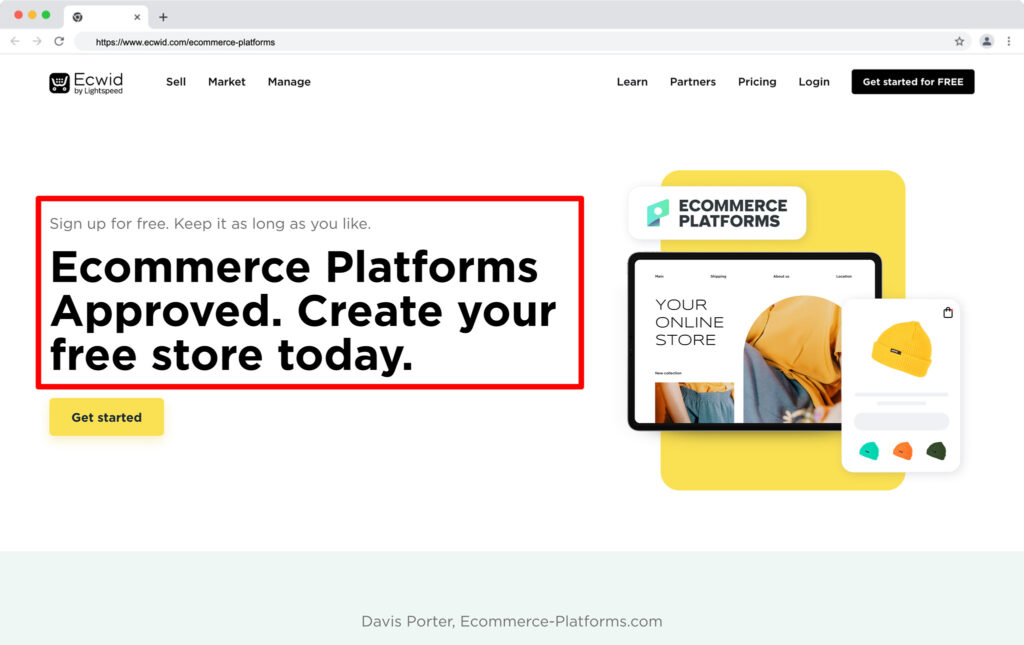
Ecwid by Lightspeed is a convenient digital platform for companies looking to sell across multiple platforms. Social media and marketplace integrations mean you can generate sales across Google, Facebook, Amazon, and even TikTok. Plus, integrations with marketing tools like Mailchimp ensure you can connect with your target audience and nurture leads consistently.
Ecwid comes with a convenient mobile app for tracking your store on the go (iOS and Android). Plus, the all-in-one dashboard makes it easy to manage all aspects of your store, from your inventory to pricing rules, and orders. Like Shopify, Ecwid also has a fantastic app marketplace, where you can leverage plugin tools from partners online.
The straightforward environment gives business leaders complete freedom to manage their online store however they choose, with no transaction fees. There’s also live support available via chat if you ever encounter any technical issues. Plus, you get unlimited bandwidth on every plan. If you’re looking for ease of use, this could be the ideal tool for you.
The Free Plan
There are various pricing plans available for Ecwid. The free plan from Ecwid features no transaction fees or monthly costs. However, it will only allow you to sell up to 5 physical products. The service comes with unlimited bandwidth, a convenient site builder, and the option to sell across multiple sites. There’s one-tap checkout with Apple Pay, through Stripe, built-in GDPR compliance, and a host of free website templates too.
Pros:
- Unlimited bandwidth on every plan
- Ideal for omnichannel selling
- Easy to use environment for beginners
- Various payment options
- Integrated advertising tools
Cons:
- No multi-channel selling on the free plan
- Limited products on the free package
Further reading 📚
3. Medusa.JS

One of the most interesting up-and-coming platforms in the ecommerce landscape, Medusa, like WooCommerce, is an open-source solution. The entirely customizable and composable environment gives developers and business leaders endless freedom to adjust their store’s performance. The easy-to-use coding system is also great for beginners with limited knowledge.
Medusa is built on JavaScript technology, and allows business leaders to produce all kinds of online stores, with simple commands and tools. There are also various ways to extend the functionality of your stores, with integrations and a headless API system for automated workflows. Medusa is flexible, fast, and secure, providing business leaders with tons of creative freedom.
You can maintain complete control over your currencies, as well as your payment, logistics, and fulfilment partnerships. There are even tools to help you manage taxes and shipping options already built in. Plus, you can connect and import orders from different providers, using automation flows to track all of your conversions across the web. There’s even the option to segment your audience into groups and offer them unique discount and voucher codes.
The Free Plan
Like WooCommerce, Medusa.JS is an open source platform, which means its free to download and use with absolutely no cost. The free solution includes all of the features of the platform, including APIs, multi-regional support, and advanced promotion tools. Additionally, there’s a community environment for support. However, you will need to pay extra if you want to access guided technical support from the Medusa team and a custom domain.
Pros:
- Endless customization and extensibility
- Lots of options for payment integrations
- Multi-channel selling with automations
- Headless API infrastructure for growing brands
- Audience segmentation and management
Cons:
- Requires some developer knowledge
- You will need to pay for extra support
Further reading 📚
4. WooCommerce
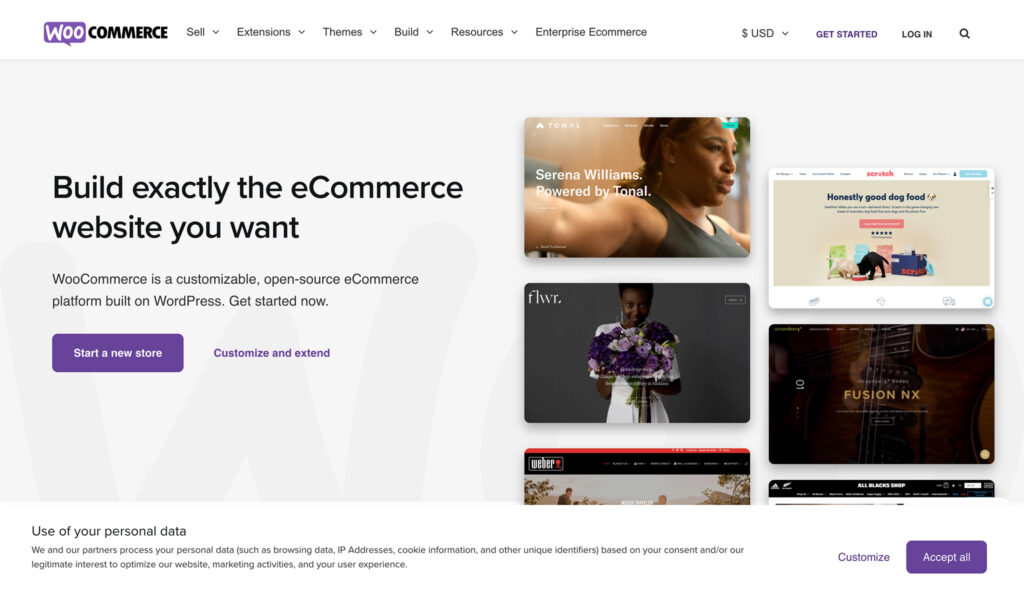
Built for one of the most popular open source website builders around, the WooCommerce plugin slots into the WordPress platform, to instantly transform your site into a store. This flexible solution is ideal for companies looking for a quick and convenient way to start selling online. Not only does it offer various sales tools as standard, but it also gives business leaders a lot of creative freedom.
You can build just about any kind of store you’d like, using templates and free themes for WordPress. Plus, WooCommerce works well with a range of other WordPress plugins, so you can expand your functionality with marketing and sales tools. The platform is scalable and secure, with various payment options and inventory tracking tools available to access.
Business leaders can create omnichannel sales plans, and sell across social media, or partner with a dropshipping or print on demand provider. Additionally, for beginners, WooCommerce has one of the best online communities available, with endless resources to tap into. You’ll have no problem creating an amazing storefront with a custom domain, tutorials, and endless guidance.
The Free Plan
WooCommerce is an open-source tool, which means there’s absolutely no price to pay to add it to your WordPress website. The app is free to download and install, and includes all of the features WooCommerce has to offer. However, there may be additional costs to consider, such as hosting for your WordPress website, domain names, and processing fees. If you want to add extra premium plugins and themes, there may be a cost there too.
Pros:
- Exceptional customization options
- Lots of powerful plugins via WordPress
- Easy-to-use backend environment and themes
- Unlimited options for digital and physical products
- Powerful and secure payment processing
Cons:
- May require some basic developer knowledge
- There are other costs to consider
Further reading 📚
5. Shift4Shop
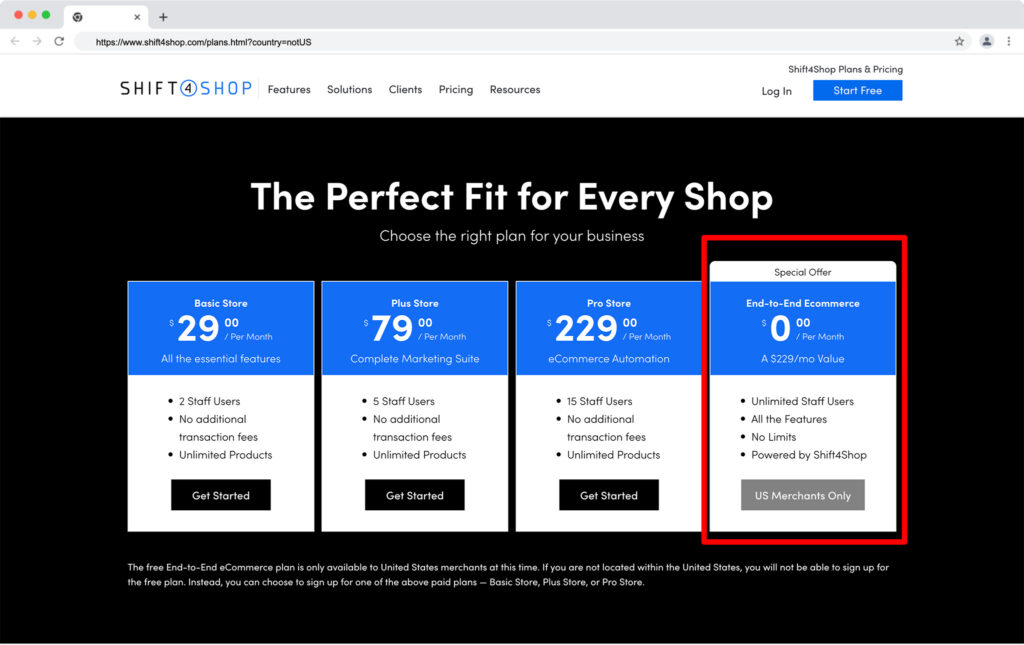
One of the better-known ecommerce platforms on the landscape today, Shift4Shop ensures any business owner can launch an online store with minimal effort. The turn key solution comes with an intuitive website builder, complete with various professionally designed templates. The themes are industry-specific, SEO optimized, and mobile friendly.
Within the design tool, you can edit CSS and HTML, and access a range of experts for extra support. There are also built-in tools for order management, email, and social media marketing. Shift4Shop also provides free fraud protection (Driven by AI), as well as migration services.
Shift4Shop’s hosted platform will manage your payments for you from end-to-end, with quick and easy processing setup options. You can also support digital wallets like Apple and Google Pay. The service is PCI compliant, and includes access to exceptional customer support, available all days of the year. There are also tons of resources and articles to get you started.
The Free Plan
Shift4Shop has a free plan available exclusively for US sellers. The solution comes with all of the available features in the professional plan, as well as unlimited users. PCI compliance is included, as well as all of the builder tools and marketing solutions. However, you will need to pay for per-transaction processing fees.
Pros:
- Comprehensive range of features
- Free SSL certificate and PCI compliance
- Free domain name and website themes
- Easy-to-use environment with plenty of support
- Tons of payment processing options
Cons:
- You will need to pay transaction fees on the free plan
- The free plan is only available in the US
Further reading 📚
6. Weebly
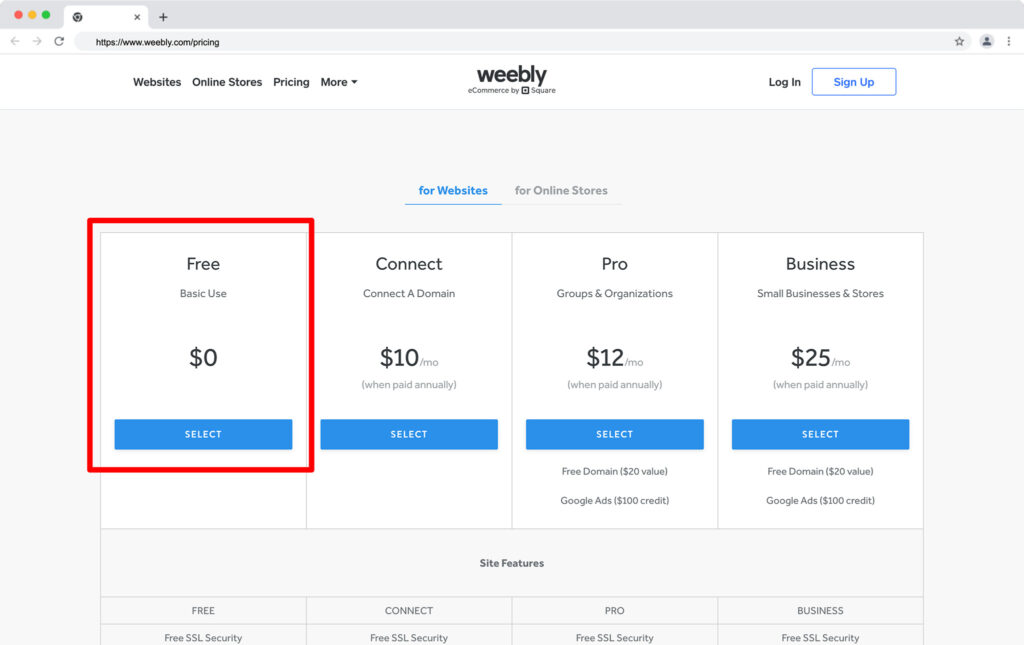
One of the simplest and most flexible online store builders around, Weebly makes it easy for anyone to produce a stunning website in a short space of time. The website builder is convenient and straightforward, with various themes and templates to choose from. Every theme is fully customizable, and mobile friendly, so you can reach customers anywhere.
Square payment processing is built-in, alongside various other great features like site search, video and audio hosting, and custom HTML/CSS and JavaScript editing. Weebly also comes with great analytical tools included, so you can track the performance of your store over time. Plus, there’s an iPhone and Android friendly app available for sellers on the go.
Weebly’s hosted plan comes with SSL certificates, DDoS mitigation, and domain management. Plus, you can leverage a range of marketing tools to increase sales, from SEO-enhanced blogs, to AdWords credit, and email marketing. There’s even an app center where you can find plugins and integrations to boost your store’s performance.
The Free Plan
The free plan from Weebly comes with free SSL security, 500MB of storage, and a domain with Weebly branding. However, there are no ecommerce features included unless you upgrade to a premium plan, which could be an issue for any store creators. You do get access to lead capture forms, search engine optimization, and chat/email support though.
Pros:
- Excellent for beginners building an online website
- Marketing and sales tools included
- Lots of security features for safe browsing
- App available for on-the-go access
- Convenient and easy-to-use website builder
Cons:
- No ecommerce functionality on the free plan
- Some limitations for scalability
Further reading 📚
7. Webflow

Created for beginners without coding or developer knowledge, Webflow is a straightforward cloud-based platform. The solution comes with a smart code-free drag-and-drop builder, to help you customize the appearance and performance of your website. There are collaboration tools built-in, so you can bring your entire team together on the same platform.
Webflow also allows you to dive into code if you choose, with HTML, CSS, and JavaScript options. Alongside selling physical and digital products, companies can also monetize members-only content on their website, and leverage a range of marketing tools. Everything is optimized to help you stand out online, and there’s the option to access your own blog.
Companies can also leverage automated workflows to simplify the process of running their store. Plus, you’ll be able to take advantage of numerous educational resources and tools to guide you through getting started online. There are even courses and community platforms available, as well as the ability to hire an expert if you need extra help.
The Free Plan
Otherwise known as the “Starter” plan, the free plan from Webflow allows you to experiment with the platform using A webflow.io domain. You’ll be able to use 50 CMS items, access 50 form submissions, and 1 GB of bandwidth. There are also various marketing and advertising tools to help boost your store’s performance, admin tools, and security features. However, you won’t be able to launch your store on the free plan.
Pros:
- Easy for non-coders and developers alike
- Automated workflows for marketing and sales
- Collaboration features to bring your team together
- Lots of support and resources to access
- Secure and fast selling options
Cons:
- No ecommerce options on the free plan
- Limited marketing and sales on the free service
Choosing a Free Shopify Alternative
When it comes to choosing the best Shopify alternatives, there are plenty of options out there, from Squarespace and Wix, to Bigcommerce, Magento, Volusion, Sellfy, and Big Cartel.
However, for small businesses who want to launch an online business or ecommerce website with limited cash, you may find your options are a little more limited. All of the options above come with a free basic plan available to help you launch your site, however they’re quite limited in regards to advanced features.
While some options will come with web hosting, marketing features, payment processor tools (for credit cards and online wallets), and a user-friendly interface, you may have limited scalability. The built-in features on a free ecommerce plan are often quite simplistic.
As your ecommerce business grows, and you need more third-party apps, modules, and inventory management capabilities, you might need to think about moving your existing website elsewhere.
It's also worth noting some of the free Shopify alternatives offered above can come with extra expenses to consider, such as additional transaction fees or hosting costs. On the plus side, they should give you the functionality you need to launch a store online.




Comments 0 Responses